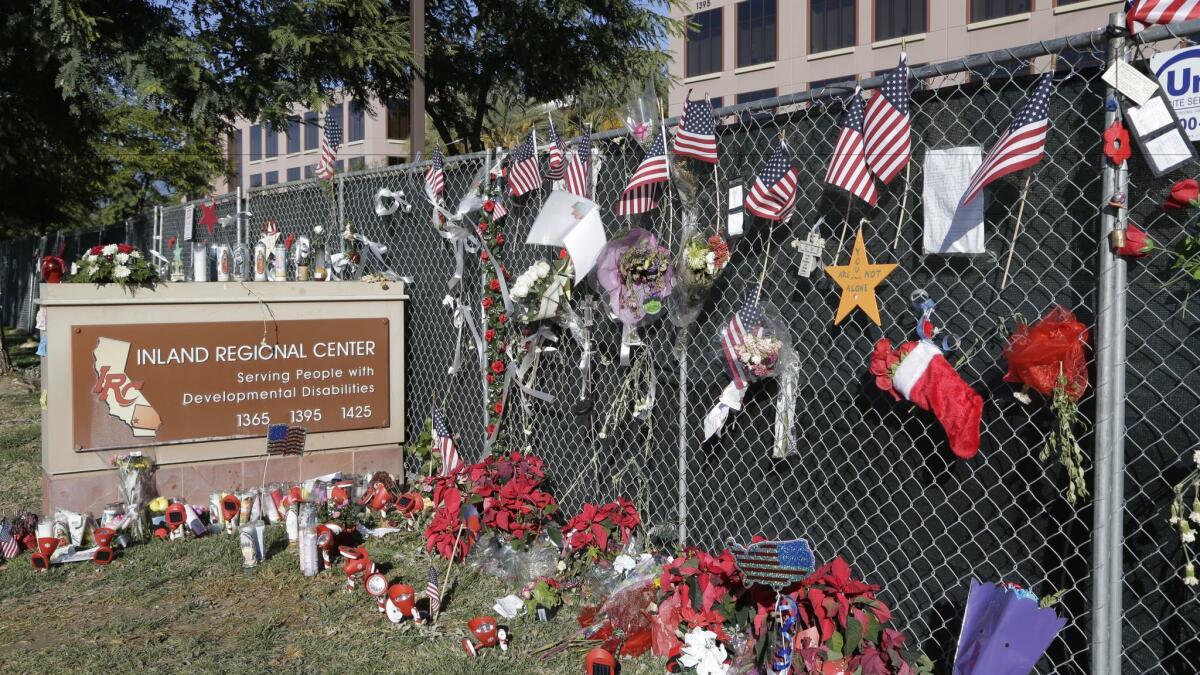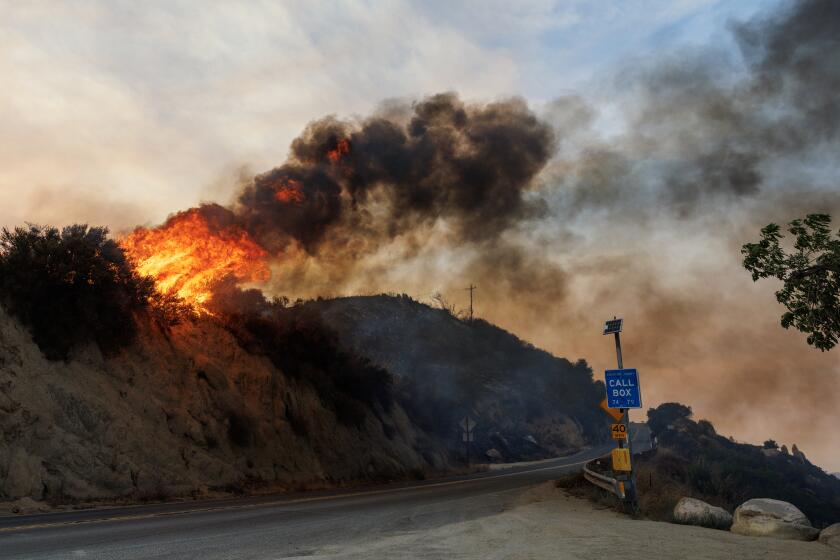Struggling San Bernardino wrote to Trump for help but ended up only raising local suspicions

President Trump often invokes San Bernardino when he talks about the threat of terrorism.
But the city’s struggles with violence go far beyond the terrorist attack on Dec. 2, 2015, that killed 14 people at the Inland Regional Center. Its violent crime rate routinely ranks among the worst in the state. Last year, the city had the most homicides in two decades.
So when San Bernardino’s leaders heard that Trump was making comments about intervening in Chicago’s homicide problem, they sent him a letter asking for assistance.
“President Trump had gone to Chicago, or called out Chicago,” City Manager Mark Scott said. “We listened to that, and we were saying, ‘We’ll take help.’ ”
The letter was written by the mayor and signed by the city attorney, city manager, police chief and all City Council members.
But the written request has been extremely controversial in this city, where only about a quarter of residents cast their ballots for Trump. The letter was not discussed publicly by the council before it was sent, and it focused heavily on requesting federal assistance with marijuana enforcement only a few months after voters overturned a citywide ban on pot businesses.
Read the letter sent to President Trump »
There’s a lot of fear of what is the intent of the letter.
— Rocio Ruiz, organizer with Inland Congregations United for Change
Some residents also worry that Trump’s divisive rhetoric on immigration and crime in minority communities means that federal intervention will only incite fear in their diverse city.
The letter does not make many specific requests, and various city officials appear to interpret it differently.
In its most detailed section, the letter blames Obama-era guidelines that restrict federal marijuana enforcement for leaving cities, such as San Bernardino, vulnerable because of limited resources.
The request for Trump’s help came three months after voters approved Measure O, which created a regulatory and permitting system for marijuana businesses in the city. Before the vote, San Bernardino had banned such businesses, and a number of municipal leaders opposed the initiative.
“Voters adopted a local measure and then a statewide measure to regulate [marijuana]. That means that people in this community and people in the state want to see it bring revenue into the city and the community,” said Rocio Aguayo, a student at San Bernardino Valley College.
Instead of enforcing the will of the voters, she said, the mayor’s letter “is criminalizing us.”
Other residents said they worry the letter is inviting a federal crackdown that would threaten the trust between law enforcement and residents. They contend that federal action could spread fear among residents who are on edge because of the president’s efforts to increase deportations.
“We have a community where we have a lot of undocumented families. So there’s a lot of fear of what is the intent of the letter,” said Rocio Ruiz, an organizer with Inland Congregations United for Change that has brought attention to San Bernardino’s violence problem.
There were 62 homicides in the city in 2016 — a 41% increase from 2015 and the deadliest year in San Bernardino since 1995. There have been eight homicides so far this year.
Last week, Ruiz and several other people showed up at a public appearance of Mayor R. Carey Davis to voice their displeasure with the letter. The meeting turned heated as frustrated residents confronted the mayor and others.
Davis, who spearheaded the effort, declined repeated requests from The Times to discuss the letter.
Meanwhile, council members offered different ideas about the assistance they would like from the federal government.
Councilman Henry Nickel said he would welcome an “initial surge” in federal law enforcement to help boost the city’s depleted Police Department, while Councilman James Mulvihill wanted only to ask for financial support.
Councilwoman Virginia Marquez said she is open to any ideas the administration may have to help the city curb drugs and violence, though she did not have any specific requests in mind.
The city has not yet received a response to the letter, which was sent in mid-February. Still, Scott, the city manager, acknowledged that it had caused some confusion and frustration.
It’s been interpreted as if we were saying send us the National Guard. ... That’s not what we were asking for.
— City Manager Mark Scott
He said he believed that most officials who signed the letter did so because they want federal financial help for the city, which has been devastated by a prolonged bankruptcy. They didn’t anticipate that it would focus so heavily on marijuana, he added.
Scott mentioned that last year under the Obama administration, the U.S. Department of Justice approved a $2.8-million grant to help the city hire 11 new police officers. The hope, he said, was that by engaging Trump, the city might be better positioned for similar help in the future.
“It’s been interpreted as if we were saying send us the National Guard or something,” he said. “That’s not what we were asking for. All the letter does is ask for a meeting.”
On Monday, several residents confronted the council at its bi-monthly meeting, and the city attorney warned that council members might have violated the state’s open-meetings law by approving the letter without a public hearing.
“This letter is creating a lot of fear in our community,” said Miriam Nieto of San Bernardino Generation Now, which aims to improve the city through civic participation. “If you meant for this letter to help our community, know that at the moment, it is not.”
Councilman Fred Shorett said in retrospect that the way the letter was handled and written “was probably a mistake.”
But others defended it. “We need help,” Councilwoman Bessine Richard said. “That’s the way I took the letter, that we need help. … We need money.”
Still, the council unanimously adopted a resolution requiring that any letter sent by a majority of its members be placed on the agenda and discussed publicly before approval.
Later this week, City Atty. Gary Saenz said he plans to advise the council to rescind the letter to avoid a possible lawsuit over whether it was sent in violation of state law. The council could, after a public hearing, decide to send it again, he added.
Twitter: @palomaesquivel
ALSO
What if you held an election and 80% of voters didn’t care?
Millions of Californians would likely lose coverage under GOP Obamacare replacement, experts say
A section of the San Andreas fault close to L.A. could be overdue for a major earthquake
UPDATES:
March 8, 2:45 p.m.: This article was updated with new information from the city attorney.
This article was originally published at 2 p.m. March 7.
More to Read
Sign up for Essential California
The most important California stories and recommendations in your inbox every morning.
You may occasionally receive promotional content from the Los Angeles Times.











